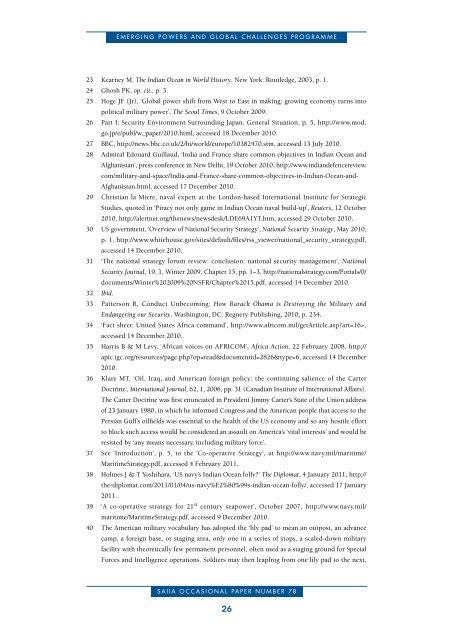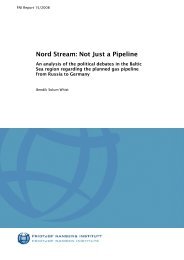Africa and the Geopolitics of the Indian Ocean
Africa and the Geopolitics of the Indian Ocean
Africa and the Geopolitics of the Indian Ocean
You also want an ePaper? Increase the reach of your titles
YUMPU automatically turns print PDFs into web optimized ePapers that Google loves.
EMERgINg POwERS ANd gLOBAL ChALLENgES PROgRAMME<br />
23 Kearney M, The <strong>Indian</strong> <strong>Ocean</strong> in World History. New York: Routledge, 2003, p. 1.<br />
24 Ghosh PK, op. cit., p. 3.<br />
25 Hoge JF (Jr), ‘Global power shift from West to East in making: growing economy turns into<br />
political military power’, The Seoul Times, 9 October 2009.<br />
26 Part I: Security Environment Surrounding Japan. General Situation, p. 5, http://www.mod.<br />
go.jp/e/publ/w_paper/2010.html, accessed 18 December 2010.<br />
27 BBC, http://news.bbc.co.uk/2/hi/world/europe/10382470.stm, accessed 13 July 2010.<br />
28 Admiral Edouard Guillaud, ‘India <strong>and</strong> France share common objectives in <strong>Indian</strong> <strong>Ocean</strong> <strong>and</strong><br />
Afghanistan’, press conference in New Delhi, 19 October 2010, http://www.indi<strong>and</strong>efencereview.<br />
com/military-<strong>and</strong>-space/India-<strong>and</strong>-France-share-common-objectives-in-<strong>Indian</strong>-<strong>Ocean</strong>-<strong>and</strong>-<br />
Afghanistan.html, accessed 17 December 2010.<br />
29 Christian la Miere, naval expert at <strong>the</strong> London-based International Institute for Strategic<br />
Studies, quoted in ‘Piracy not only game in <strong>Indian</strong> <strong>Ocean</strong> naval build-up’, Reuters, 12 October<br />
2010, http://alertnet.org/<strong>the</strong>news/newsdesk/LDE69A1YT.htm, accessed 29 October 2010.<br />
30 US government, ‘Overview <strong>of</strong> National Security Strategy’, National Security Strategy, May 2010,<br />
p. 1, http://www.whitehouse.gov/sites/default/files/rss_viewer/national_security_strategy.pdf,<br />
accessed 14 December 2010.<br />
31 ‘The national strategy forum review: conclusion: national security management’, National<br />
Security Journal, 19, 1, Winter 2009, Chapter 15, pp. 1–3, http://nationalstrategy.com/Portals/0/<br />
documents/Winter%202009%20NSFR/Chapter%2015.pdf, accessed 14 December 2010.<br />
32 Ibid.<br />
33 Patterson R, Conduct Unbecoming: How Barack Obama is Destroying <strong>the</strong> Military <strong>and</strong><br />
Endangering our Security. Washington, DC: Regnery Publishing, 2010, p. 234.<br />
34 ‘Fact sheet: United States <strong>Africa</strong> comm<strong>and</strong>’, http://www.africom.mil/getArticle.asp?art=16>,<br />
accessed 14 December 2010.<br />
35 Harris B & M Levy, ‘<strong>Africa</strong>n voices on AFRICOM’, <strong>Africa</strong> Action, 22 February 2008, http://<br />
apic.igc.org/resources/page.php?op=read&documentid=2826&type=6, accessed 14 December<br />
2010.<br />
36 Klare MT, ‘Oil, Iraq, <strong>and</strong> American foreign policy: <strong>the</strong> continuing salience <strong>of</strong> <strong>the</strong> Carter<br />
Doctrine’, International Journal, 62, 1, 2006, pp. 31 (Canadian Institute <strong>of</strong> International Affairs).<br />
The Carter Doctrine was first enunciated in President Jimmy Carter’s State <strong>of</strong> <strong>the</strong> Union address<br />
<strong>of</strong> 23 January 1980, in which he informed Congress <strong>and</strong> <strong>the</strong> American people that access to <strong>the</strong><br />
Persian Gulf’s oilfields was essential to <strong>the</strong> health <strong>of</strong> <strong>the</strong> US economy <strong>and</strong> so any hostile effort<br />
to block such access would be considered an assault on America’s ‘vital interests’ <strong>and</strong> would be<br />
resisted by ‘any means necessary, including military force’.<br />
37 See ‘Introduction’, p. 5, to <strong>the</strong> ‘Co-operative Strategy’, at http://www.navy.mil/maritime/<br />
MaritimeStrategy.pdf, accessed 4 February 2011.<br />
38 Holmes J & T Yoshihara, ‘US navy’s <strong>Indian</strong> <strong>Ocean</strong> folly?’ The Diplomat, 4 January 2011, http://<br />
<strong>the</strong>-diplomat.com/2011/01/04/us-navy%E2%80%99s-indian-ocean-folly/, accessed 17 January<br />
2011.<br />
39 ‘A co-operative strategy for 21 st century seapower’, October 2007, http://www.navy.mil/<br />
maritime/MaritimeStrategy.pdf, accessed 9 December 2010.<br />
40 The American military vocabulary has adopted <strong>the</strong> ‘lily pad’ to mean an outpost, an advance<br />
camp, a foreign base, or staging area, only one in a series <strong>of</strong> stops, a scaled-down military<br />
facility with <strong>the</strong>oretically few permanent personnel, <strong>of</strong>ten used as a staging ground for Special<br />
Forces <strong>and</strong> Intelligence operations. Soldiers may <strong>the</strong>n leapfrog from one lily pad to <strong>the</strong> next,<br />
SAIIA OCCASIONAL PAPER NUMBER 78<br />
26













